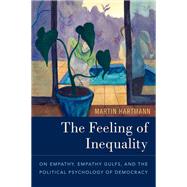How does socio-economic inequality affect our ability to relate to each other on emotional and intellectual levels? To date, public discourse on the rising level of inequality in many Western nations has been informed by quantifiable terms such as income and capital. Philosophical approaches, conversely, tend to focus on distributional aspects such as welfare, resources, and opportunities. In The Feeling of Inequality, author Martin Hartmann argues that the impact of inequality far transcends the material, highlighting the ways in which the emotional aspects of these disparities serve as engines of social differentiation.
Reinterpreting David Hume's and Adam Smith's respective theories of sympathy, Hartmann sketches a relational theory of democracy that construes equality as a social relationship, placing particular emphasis on the emotions and attitudes that often accompany inequality such as contempt, envy, shame, esteem, pride, and admiration. Hartmann then localizes these 'relative' emotions in social and cultural practices, illustrating the ways in which these emotions result in concrete manifestations of inequality. By breaking down the foundations of the various empathy gulfs plaguing contemporary democratic societies, Hartmann paves the way for a more compassionate approach to thinking about inequality.








